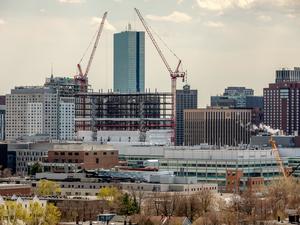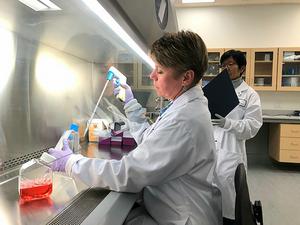
As 2018 comes to a close, we took a look at the stories that mattered this year in Boston tech—from startups to large companies. Here are some of the biggest headlines that came out during our last trip around the sun.
PillPack Acquired by Amazon
In a non-related-to-HQ2 move, the tech titan made a huge step into the drug-delivery market by entering into a definitive merger agreement to acquire Somerville-based PillPack. The "just under 1 billion" deal, which scooped Amazon competitors like Walmart and CVS, was announced at the end of June. The online pharmacy startup founded by T.J. Parker and Elliot Cohen in 2013 raised $118 million in funding, according to Crunchbase. It's not the only Boston company that Amazon took home in 2018: in January, it acquired Sqrrl for just over $40 million. Nothing compared to other major acquisitions involving Boston companies, including Grubhub acquiring Boston-based LevelUp for $390 million and Siemens acquiring Boston software firm Mendix for over $700 million.
SoftBank Cuts a $500M Check for CMT
One of the biggest funding rounds of the year for a Massachusetts company (and likely the biggest cash grab for a local tech venture this year) happened in the second half of December. The beneficiary is Cambridge Mobile Telematics (CMT), a Kendall Square-based company with 70 employees that started from MIT’s Computer Science and Artificial Intelligence Lab. The company announced that it received an investment of $500 million. SoftBank’s massive $100 billion Vision Fund is led by Tokyo-based Masayoshi Son and nine other managing partners who are mostly from the world of banking. Almost half of the fund comes from Saudi Arabia’s sovereign wealth, which has put in $45 billion.
Amazon, Berkshire and JPMorgan's New Healthcare Company
Amazon’s Jeff Bezos, Berkshire Hathaway’s Warren Buffett and JPMorgan’s Jamie Dimon selected Boston as headquarters for their (still unnamed) healthcare company. The trio announced in June that the company will be led by Dr. Atul Gawande, a general and endocrine surgeon at Brigham and Women’s Hospital and a professor at Harvard Medical School. Three months later, the company hired its first COO: Jack Stoddard, a digital health specialist who instituted progressive benefit policies at Comcast.
Jibo & Rethink Robotics Powering Down
State records show that Boston-based Jibo filed a withdrawal of its certificate of registration on Nov. 14, BBJ reported. The move means that the social robot startup founded in 2012 can no longer do business in Massachusetts. In June, Jibo confirmed layoffs, which the company qualified as a “significant” reduction. The social robot startup was founded by social robotics pioneer Cynthia Breazeal and made its first public announcement in 2014 with an Indiegogo crowdfunding campaign that raised $3.6 million from backers. Last year, Jibo was included in Time's list of the 25 best inventions of 2017 and made it to the cover of the magazine. Another local robotics company closed its doors in October 2018: Rethink Robotics, a Boston-based maker of collaborative robots for the industrial manufacturing. “A planned acquisition of the company fell through at the last moment," Jim Lawton, the company’s COO, wrote in an email to BostInno. What’s it like to run a robotics startup? “Like building a plane while flying it,” Jason Walker, who worked at companies like iRobot and CyPhy Works, told us.
Tim Berners-Lee's Startup Coming Out of Stealth
In September, Mass. resident and father of the World Wide Web Tim Berners-Lee unveiled Inrupt, a startup that plans to “unlock the true promise of the web by decentralizing the power that’s currently centralized in the hands of a few.” The primary backer of Inrupt is one of Boston's newest early-stage investment firms—Glasswing Ventures, which closed its first fund worth $112 million in July. Currently, Inrupt has about 20 workers. Other notable startups that came out of stealth mode this year are MIT-born blockchain startup Algorand (February), analytics and artificial intelligence company Forge.AI (December) and former iRobot CTO Tom Wagner's Berkshire Grey (December).
Desktop Metal vs. Markforged
Filed in March, Desktop Metal's lawsuit accused a former intern of pilfering secrets about the company's metal-printing technology and sharing them with 3-D printing rival Markforged via the intern's brother, who is an engineer there. Markforged responded with claims of its own. In September, just days into a trial that was scheduled to last for weeks, the two companies settled.
Carbon Black's $100M IPO
The state's first tech company to file for an initial public offering in 2018 was Carbon Black, a Waltham-based cybersecurity company that reported $162 million in revenue in 2017. The company pursued an IPO of up to $100 million. During its first day of trading in May, shares surged 26% above the IPO price to close at $23.94. The company confirmed that it had secretly filed for an IPO with the Securities and Exchange Commission back in September 2016, with that filing becoming public in April 2018. Two months later, another local tech company, Cambridge-based insurance marketplace EverQuote, filed for a $75 million IPO.
The Rise of Circle in the Crypto-World
Following the acquisition of cryptocurrency exchange Poloniex for reportedly $400 million, Boston-based Circle was set to compete with Coinbase and a few other startups vying to be the world's most important cryptocurrency exchange. In May, Circle announced a new partnership with Bitmain, which is leading a $110 million Series E equity investment in Circle. Bitmain is "China’s biggest bitcoin mining company," according to The Financial Times, and the funding round "brings together two of the nascent sector’s leading companies from the world’s two largest economies."
MIT's $1B Bet on AI
In October, MIT made the single largest investment in computing and AI by an American academic institution. The Cambridge-based university announced a new $1 billion investment that will have its epicenter in a signature new building on MIT’s campus: the new MIT Schwarzman College of Computing will be an interdisciplinary hub for work in computer science, AI, data science and related fields. The college, which represents the most significant structural change to MIT since the early 1950s, is slated to open in September 2019, with construction of a new building for the College scheduled to be completed in 2022.
The Protests Against Google
In November, several hundred Google employees in Kendall Square joined thousands of others worldwide in a public walkout meant to force the tech giant to better address gender inequality and alleged sexual harassment within the company, BBJ reported. The protest come in response to an October story by The New York Times about the $90 million payout that Android creator Andy Rubin received in 2014 as he was pushed out of the company in the face of a sexual misconduct allegation.
Cambridge, Somerville vs. Electric Scooters
The attempt of electric scooter companies to become popular in Massachusetts hit some bumps in the road. In August, both Cambridge and Somerville sent Silicon Valley scooter startup Bird cease-and-desist letters and then began impounding the company’s electric scooters. Cambridge City Council’s Transportation and Public Utilities Committee met in September to discuss a plan to roll out electric scooter rental services in Cambridge and surrounding municipalities as early as January 2019.
Amazon's HQ2
Alright, not exactly a local story—in the end, Northern Virginia’s Crystal City and New York City's Long Island landed the Seattle e-commerce giant's second headquarters. However, nobody can deny that Amazon's year-plus long hunt for HQ2 (here's a timeline) was one of the biggest tech stories of the year. From a local perspective, the exclusion of Boston and Cambridge brought sighs of relief in the Boston tech community, which would have been impacted by the downsizes of Amazon's promised 50,000-person hiring spree (companies already struggling to attract and retain talented workers, a predictable spike in rents, and so on). And it's not that Amazon completely ignored Boston in 2018: in May, shortly before the announcement of the PillPack acquisition, Amazon said it will bring 2,000 new tech jobs to Seaport.








